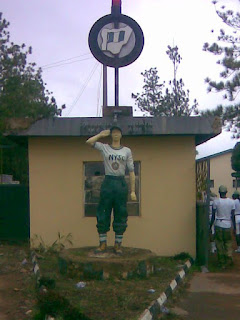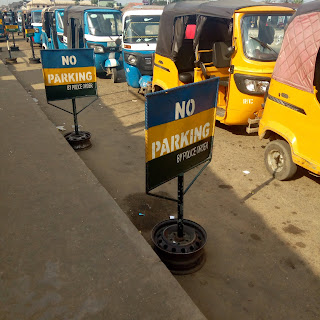Remembering Ken Saro Wiwa as The Activist
November 10 is a day that every Ogoni man or woman remembers as a black day. It was 1995 and under the regime of a military junta and despot known as Abacha. The #Ogoni9 were accused of murder, tried and hanged under very bizarre circumstances. Late Ken Saro Wiwa was one of them and the leading voice of the Movement for the Survival of the Ogoni People, MOSOP.
The first time I came across the name MOSOP was in my primary school days. It was boldly written on a blue and red sunshade cap that hung conspicuously on the frame of my father's dressing mirror. I believe it occupied this special position not for the absence of a better place to put it, but so that when he looks at the mirror, he would catch a glimpse of it and step out for the days activities remembering the ecological imperialism and genocide his people have suffered. There were days this cap disappeared and also did my Dad. Now I understand he may have had crucial meetings in the village where he spent most of his weekends. Although he told me little or nothing about the struggle, I am more aware of the gravity of injustice done, and those who started this struggle.
Dad has been gone for over a decade now and Ken Saro-Wiwa for over two decades (God rest their souls). No significant change has occurred in Ogoni, especially the restoration of the land to its fertile state. The implementation of the recommendations of the United Nations Environmental Program (UNEP) report has been flagged off, a board known as HYPREP has been set up, consultations have been on with the people and their leaders, but people have complained of the snail-paced process. Some have even called it a political venture, but that's not the reason for this post. "Though hope is frail, it's hard to kill" says a line of the popular duet by Mariah Carey and Whitney Houston entitled 'When you Believe', and that's the message I'm sticking with. "You can kill the messenger but not the message" is a popular quote attributed to the late activist , and as long as the message stays alive, so does hope.
PhotoCredit: Noo Saro Wiwa
Being a graduate of English and Literary Studies exposed me to several works that reflect and refract the Nigerian society as a whole, and the Niger Delta in particular. Having done a comprehensive study of the Niger Delta subaltern, I acquainted myself with resources on the history of hegemony and denigration in the region, as well as those who have been at the fore of agitations to restore the land and life of the people. One of the literary texts I examined is The Activist by Tanure Ojaide, who honours the great Ogoni martyr by dedicating this work of fiction to Late Ken Saro-Wiwa. In more ways than one, the protagonist is modeled after Saro-Wiwa: an archetype that embodies this battle lord, who puts himself on the frontline, in the face of the government and the foreign oil companies.
Just like Saro-Wiwa, The Activist in The Activist stands in conflict with the antagonistic social realities in the Niger Delta State which is his homeland. He is portrayed in heroic terms, drawing readers to his cause for achieving an environmentally friendly state, and exposing us to the means he employs in bringing succor to his people. The theme of messianic leadership is a motif in African literature, and this character is used to depict this theme perfectly. He is a round and dynamic character, changing from a mere immigrant to a social and political liberator. He is presented as one who suffers from nostalgia, then as one who gradually becomes aware and affected by the happenings in his environment. His personal experiences give a picture of this and begin with him being a victim of the brutality of the government in power. This renegade trait is one possessed by catalysts and most revolutionaries.
The Activist is also presented as one who prepares himself mentally and otherwise, for tasks ahead. He is calculative, precautious and rational. He is self-driven, and has a penchant for nature and people: a factor that fuels this choice of becoming a protest bug. From the foregoing, it is clear that of great concern to him is the plight of the subalterns in the society.
In conclusion, therefore, the success of the Activist breaks down the existing hegemony of those at the helm of affairs and brings succor to the subalterns. Unlike the sad fate of Saro-Wiwa, he lives to see a victorious and liberated region that thrives on its resources. Everyone is pleased with the changes that occur, and this picture of hope is given to anyone who reads this work. Faith and optimism reverberates in the conclusion of this text, implying that the efforts of Saro-Wiwa and others who have lost their lives in the fight against injustice, would never be in vain.
The first time I came across the name MOSOP was in my primary school days. It was boldly written on a blue and red sunshade cap that hung conspicuously on the frame of my father's dressing mirror. I believe it occupied this special position not for the absence of a better place to put it, but so that when he looks at the mirror, he would catch a glimpse of it and step out for the days activities remembering the ecological imperialism and genocide his people have suffered. There were days this cap disappeared and also did my Dad. Now I understand he may have had crucial meetings in the village where he spent most of his weekends. Although he told me little or nothing about the struggle, I am more aware of the gravity of injustice done, and those who started this struggle.
Dad has been gone for over a decade now and Ken Saro-Wiwa for over two decades (God rest their souls). No significant change has occurred in Ogoni, especially the restoration of the land to its fertile state. The implementation of the recommendations of the United Nations Environmental Program (UNEP) report has been flagged off, a board known as HYPREP has been set up, consultations have been on with the people and their leaders, but people have complained of the snail-paced process. Some have even called it a political venture, but that's not the reason for this post. "Though hope is frail, it's hard to kill" says a line of the popular duet by Mariah Carey and Whitney Houston entitled 'When you Believe', and that's the message I'm sticking with. "You can kill the messenger but not the message" is a popular quote attributed to the late activist , and as long as the message stays alive, so does hope.
PhotoCredit: Noo Saro Wiwa
Being a graduate of English and Literary Studies exposed me to several works that reflect and refract the Nigerian society as a whole, and the Niger Delta in particular. Having done a comprehensive study of the Niger Delta subaltern, I acquainted myself with resources on the history of hegemony and denigration in the region, as well as those who have been at the fore of agitations to restore the land and life of the people. One of the literary texts I examined is The Activist by Tanure Ojaide, who honours the great Ogoni martyr by dedicating this work of fiction to Late Ken Saro-Wiwa. In more ways than one, the protagonist is modeled after Saro-Wiwa: an archetype that embodies this battle lord, who puts himself on the frontline, in the face of the government and the foreign oil companies.
Just like Saro-Wiwa, The Activist in The Activist stands in conflict with the antagonistic social realities in the Niger Delta State which is his homeland. He is portrayed in heroic terms, drawing readers to his cause for achieving an environmentally friendly state, and exposing us to the means he employs in bringing succor to his people. The theme of messianic leadership is a motif in African literature, and this character is used to depict this theme perfectly. He is a round and dynamic character, changing from a mere immigrant to a social and political liberator. He is presented as one who suffers from nostalgia, then as one who gradually becomes aware and affected by the happenings in his environment. His personal experiences give a picture of this and begin with him being a victim of the brutality of the government in power. This renegade trait is one possessed by catalysts and most revolutionaries.
The Activist is also presented as one who prepares himself mentally and otherwise, for tasks ahead. He is calculative, precautious and rational. He is self-driven, and has a penchant for nature and people: a factor that fuels this choice of becoming a protest bug. From the foregoing, it is clear that of great concern to him is the plight of the subalterns in the society.
In conclusion, therefore, the success of the Activist breaks down the existing hegemony of those at the helm of affairs and brings succor to the subalterns. Unlike the sad fate of Saro-Wiwa, he lives to see a victorious and liberated region that thrives on its resources. Everyone is pleased with the changes that occur, and this picture of hope is given to anyone who reads this work. Faith and optimism reverberates in the conclusion of this text, implying that the efforts of Saro-Wiwa and others who have lost their lives in the fight against injustice, would never be in vain.




Comments
Post a Comment